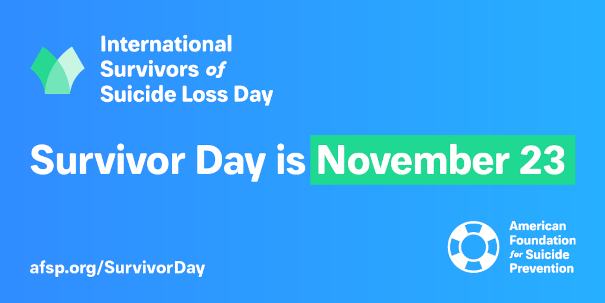International Survivors of Suicide Loss Day
 Nov. 23 is International Survivors of Suicide Loss Day, a day designated by Congress as a day for those affected by suicide to come together for healing and support. It falls on the Saturday before Thanksgiving each year.
Nov. 23 is International Survivors of Suicide Loss Day, a day designated by Congress as a day for those affected by suicide to come together for healing and support. It falls on the Saturday before Thanksgiving each year.
More than 47,000 people in the U.S. died by suicide in 2017, and the suicide rate in the U.S. has increased every year for the past decade. Suicide is the second leading cause of death among teens and young adults (age 10 to 34) and the fourth leading cause among adults 35 to 54. Suicide occurs among people of all ages and demographic groups.
Each loss leaves family and friends grieving and struggling to understand and cope. Yet because of the stigma around suicide and mental illness, and complicated emotions around suicide, people often don’t reach out for support or get needed help to cope with the tragic loss.
Several recent studies point to the importance of talk and support for the well-being of survivors. One study of survivors of suicide loss found that feelings of belongingness, talking about the loss, and social support play critical roles in helping recovery and growth after the loss. A 2019 study of suicide loss found that more social support was significantly associated with fewer depressive symptoms, decreased grief difficulties and increased personal growth.
Another study found that family and friends often do not talk about their tragedy with others and that the lack of sharing contributes to loneliness, detachment, more difficulty coping and a greater likelihood of sleep problems and depression. The authors conclude that when suicide survivors talk and share with others, the greater sense of support can help facilitate their recovery and protect them against persistent grief and harmful effects of bereavement.
The American Foundation for Suicide Prevention offers several ways for survivors of suicide to connect with others and find support during their grieving. These include individual support through healing conversations, connection to local support groups, information on self-care, and ways to honor loved ones.
AFSP also supports hundreds of Survivor Day events each year in which suicide loss survivors come together to find comfort, understanding and hope. In 2018, there were 370 Suicide Survivor Day events.
“For many, Survivor Day presents an opportunity to find the strength, within ourselves and alongside fellow suicide loss survivors. We attend programs on this day to help us gain new understanding about suicide, mental health, and grief,” Doreen Marshall, Ph.D, the vice president of programs for AFSP said in a statement.
Find a Survivor Day event near you.
For several years, AFSP has also produced documentaries that offer a message of growth, resilience and connection. For example, Family Journeys, the second in the series, traces the ripple effects of a suicide through the eyes and experiences of three families. It shows how the family members are coping with the loss of their loved one, how they’re healing, and how they’re finding meaning again after living through a suicide. View the documentaries.
References
- American Foundation for Suicide Prevention
- Levi-Belz, Y and Lev-Ari, L. “Let’s Talk About It”: The Moderating Role of Self-Disclosure on Complicated Grief over Time among Suicide Survivors. Int J Environ Res Public Health. 2019 Oct; 16(19): 3740.
- Levi-Belz Y. With a little help from my friends: A follow-up study on the contribution of interpersonal characteristics to posttraumatic growth among suicide-loss survivors. Psychol Trauma. 2019 Nov;11(8):895-904. https://www.ncbi.nlm.nih.gov/pubmed/30907613
- Oexle N, Sheehan L. Perceived Social Support and Mental Health After Suicide Loss. Crisis. 2019 Apr 29:1-5. https://www.ncbi.nlm.nih.gov/pubmed/31030548
